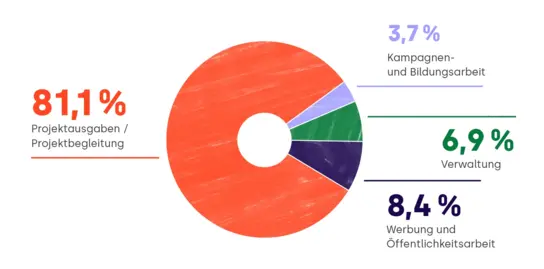Observation of action
Donors have a right to know what their money has achieved. While it's easy to demonstrate, using weight measurements or health statistics, that organic vegetable production in school gardens and regular, balanced meals improve children's nutrition, it's more complex to prove that this also leads to better learning and improved future prospects. This typically only becomes apparent long after the project has ended.
When evaluating the impact of projects Terre des Hommes places great importance on the participation of the target groups—those whose living conditions the project aims to improve. One challenge in observing and documenting impact is to learn as much as possible about the mechanisms of action and the results while keeping the effort manageable. Therefore, it is good to regularly review one's own practices, but it is not necessary to do so at every step and in every project. If it has been scientifically proven that agrochemicals impair children's cognitive development, then in a new project it is sufficient for Terre des Hommes staff on-site to document the shift to healthy food choices.
The basis for impact monitoring at Terre des Hommes is project proposals that describe the baseline situation and objectives using key performance indicators. Project partners typically submit reports every six months, providing information on progress and interim results.
Terre des Hommes experts on the ground analyze the reports and discuss the findings with partner organizations during regular visits every six months, during which the data is also checked on a random basis. Once a year, they prepare a summary report for the Terre des Hommes office in Germany. This office evaluates the information with regard to overarching issues and methods. If problems arise, if specific questions or methods need further development, or if larger projects are involved, additional evaluations are commissioned from independent external experts.
The more ambitious a project goal is, the more important it is to implement it together with other stakeholders, and the more complex the impact monitoring becomes.
Example Thailand: Terre des Hommes victims of violence
. It makes a difference whether 50 children who have been victims of violence can be healed through therapeutic services, whether a program has reduced the overall level of violence in their communities, or whether a city administration establishes support facilities and implements violence prevention programs in the schools of an entire city. The contribution of a Terre des Hommes project to changing people's lives cannot always be precisely proven. But it is clear that it must have contributed to the desired outcome.
Efficiency is an important criterion in impact monitoring: What was achieved with a specific sum of money? However, the effort involved in collecting precise figures must be proportionate to the sum available for implementing the measure.
When building a classroom, we know it will eventually be used by 30 children. Calculating how long it can be used and how many children will actually receive instruction there is more complicated. It is even more difficult to determine how many children will be cared for by a health worker trained in a Terre des Hommes project, or how many children will actually benefit from a change in the law that promises them protection and assistance.
Terre des Hommes distinguishes between the number of children or young people directly involved in the project and those who indirectly benefit. The latter is the case, for example, when they profit from a health center built as part of a project or from a successful campaign to protect fishing waters. Generally speaking, the larger the project's reach, the more complex and time-consuming it is to obtain reliable data. To limit the effort involved, Terre des Hommes relies on sampling, estimates, and experience and studies from similar projects. These figures are tracked in the project's annual reports. Separate studies or analyses are also conducted in key areas of work, when there are specific questions about the effectiveness of a method, or for large-scale projects. Terre des Hommes carries out ongoing monitoring in its funded projects based on the "Concept for Recording Impacts in Program Funding: Impacts and Impact Monitoring," adopted in 2010.
So your donation is used

With your donation of
- 24 euros you can provide a school package including pens, books and a school uniform.
- 60 euros will send a child to school for a year.
- 120 euros can be used to create a school garden for children to enrich their school meals with fresh vegetables.
